Should用法
- 格式:doc
- 大小:41.50 KB
- 文档页数:2
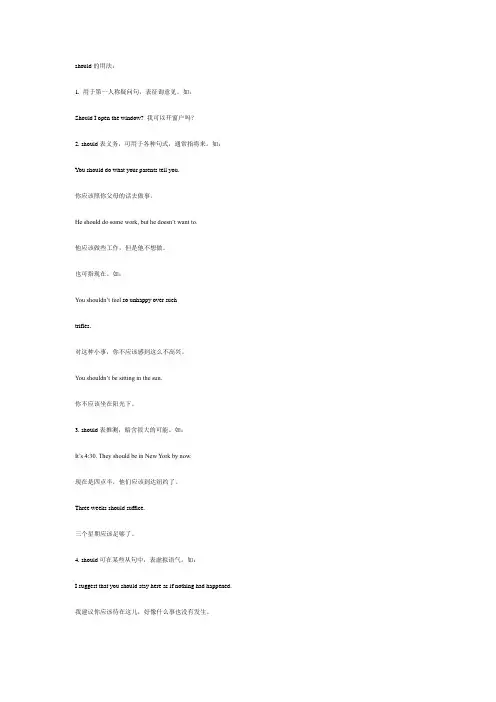
should的用法:1. 用于第一人称疑问句,表征询意见。
如:Should I open the window? 我可以开窗户吗?2. should表义务,可用于各种句式,通常指将来。
如:You should do what your parents tell you.你应该照你父母的话去做事。
He should do some work, but he doesn’t want to.他应该做些工作,但是他不想做。
也可指现在。
如:You shouldn’t feel so unhappy over suchtrifles.对这种小事,你不应该感到这么不高兴。
You shouldn’t be sitting in the sun.你不应该坐在阳光下。
3. should表推测,暗含很大的可能。
如:It’s 4:30. They should be in New York by now.现在是四点半,他们应该到达纽约了。
Three weeks should suffice.三个星期应该足够了。
4. should可在某些从句中,表虚拟语气。
如:I suggest that you should stay here as if nothing had happened. 我建议你应该待在这儿,好像什么事也没有发生。
She was terrified lest they should go on talking about her.她感到害怕,唯恐他们再说她的事。
If he should drop in, give him my message.他若来访,就将我的消息给他。
5. should表感情色彩,常用在以why, how开头的疑问句中。
如:Why shouldn’t you invite him?为什么你不邀请他?I don’t see why we shouldn’t make friends.我不明白为什么我们竟不能成为朋友。
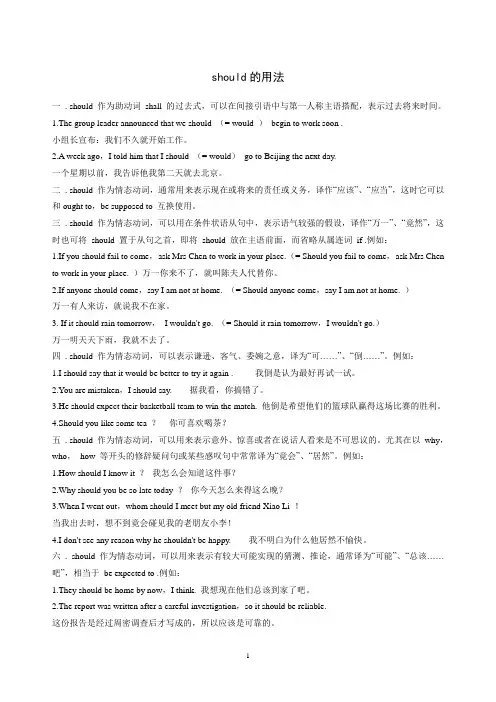
should的用法一. should 作为助动词shall 的过去式,可以在间接引语中与第一人称主语搭配,表示过去将来时间。
1.The group leader announced that we should (= would )begin to work soon .小组长宣布:我们不久就开始工作。
2.A week ago,I told him that I should (= would)go to Beijing the next day.一个星期以前,我告诉他我第二天就去北京。
二. should 作为情态动词,通常用来表示现在或将来的责任或义务,译作“应该”、“应当”,这时它可以和ought to,be supposed to 互换使用。
三. should 作为情态动词,可以用在条件状语从句中,表示语气较强的假设,译作“万一”、“竟然”,这时也可将should 置于从句之首,即将should 放在主语前面,而省略从属连词if .例如:1.If you should fail to come,ask Mrs Chen to work in your place. (= Should you fail to come,ask Mrs Chen to work in your place. )万一你来不了,就叫陈夫人代替你。
2.If anyone should come,say I am not at home. (= Should anyone come,say I am not at home. )万一有人来访,就说我不在家。
3. If it should rain tomorrow,I wouldn't go. (= Should it rain tomorrow,I wouldn't go.)万一明天天下雨,我就不去了。
四. should 作为情态动词,可以表示谦逊、客气、委婉之意,译为“可……”、“倒……”。
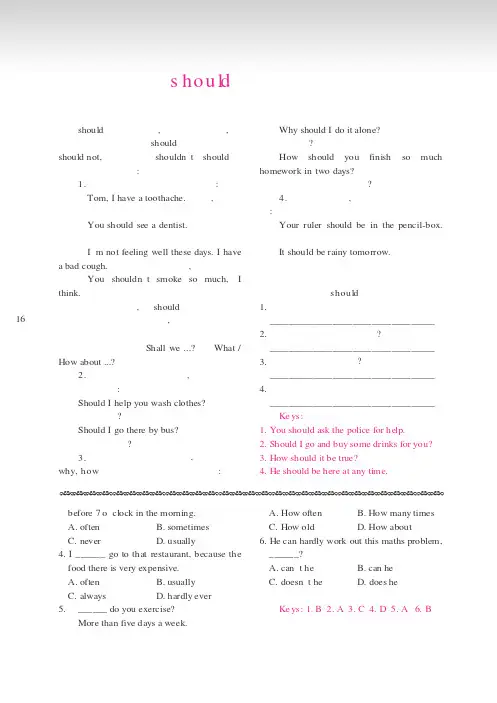
before 7o ’clock in the morning.A.often B.sometimes C.never ually 4.I ______go to that restaurant,because the food there is very expensive.A.often ually C.always D.hardly ever 5.—______do you exercise?—More than five days a week. A.How often B.How many times C.How old D.How about 6.He can hardly work out this maths problem,______?A.can ’t he B.can he C.doesn ’t he D.does he Ke ys:1.B 2.A 3.C 4.D 5.A 6.B should 属情态动词,后接动词原形,没有人称和数的变化。
should 的否定形式为should not,通常缩写为shouldn ’t 。
should 有以下几种常见用法:1.用于提出建议劝告别人。
例如:—Tom,I have a toothache.汤姆,我牙痛。
—You should see a dentist.你应当去看牙医。
—I ’m not feeling well these days.I have a bad cough.这些天我身体不适,老是咳嗽。
—You shouldn ’t smoke so much,I think.我认为你不该抽这么多烟。
需要注意的是,用should 提建议通常含有命令、批评、责备等语气,多用于熟人或朋友之间。
对上级、长辈或陌生人提建议最好使用语气委婉的Shall we ...?或What /How about ...?等句式。
2.用于第一人称疑问句中,用于征求对方意见。
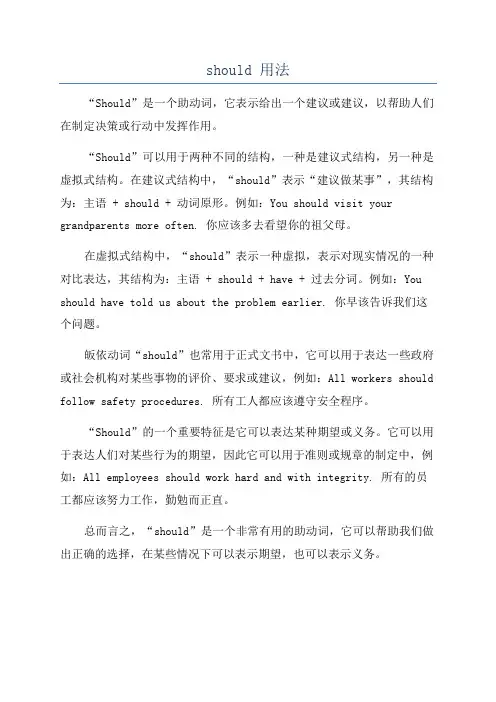
should 用法
“Should”是一个助动词,它表示给出一个建议或建议,以帮助人们在制定决策或行动中发挥作用。
“Should”可以用于两种不同的结构,一种是建议式结构,另一种是虚拟式结构。
在建议式结构中,“should”表示“建议做某事”,其结构为:主语 + should + 动词原形。
例如:You should visit your grandparents more often. 你应该多去看望你的祖父母。
在虚拟式结构中,“should”表示一种虚拟,表示对现实情况的一种对比表达,其结构为:主语 + should + have + 过去分词。
例如:You should have told us about the problem earlier. 你早该告诉我们这个问题。
皈依动词“should”也常用于正式文书中,它可以用于表达一些政府或社会机构对某些事物的评价、要求或建议,例如:All workers should follow safety procedures. 所有工人都应该遵守安全程序。
“Should”的一个重要特征是它可以表达某种期望或义务。
它可以用于表达人们对某些行为的期望,因此它可以用于准则或规章的制定中,例如:All employees should work hard and with integrity. 所有的员工都应该努力工作,勤勉而正直。
总而言之,“should”是一个非常有用的助动词,它可以帮助我们做出正确的选择,在某些情况下可以表示期望,也可以表示义务。
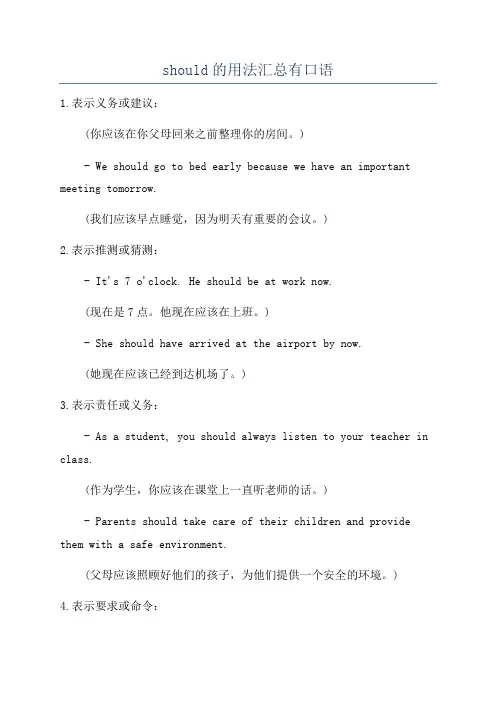
should的用法汇总有口语1.表示义务或建议:(你应该在你父母回来之前整理你的房间。
)- We should go to bed early because we have an important meeting tomorrow.(我们应该早点睡觉,因为明天有重要的会议。
)2.表示推测或猜测:- It's 7 o'clock. He should be at work now.(现在是7点。
他现在应该在上班。
)- She should have arrived at the airport by now.(她现在应该已经到达机场了。
)3.表示责任或义务:- As a student, you should always listen to your teacher in class.(作为学生,你应该在课堂上一直听老师的话。
)- Parents should take care of their children and provide them with a safe environment.(父母应该照顾好他们的孩子,为他们提供一个安全的环境。
)4.表示要求或命令:- You should apologize for your behavior.(你应该为你的行为道歉。
)- The sign says "No Smoking." You should not smoke here.(标志上写着"禁止吸烟"。
你在这里不应该吸烟。
)5.表示建议或意见:- You should try this new restaurant. The food is delicious.(你应该去尝试这家新餐厅。
食物非常美味。
)- If you want to lose weight, you should exercise regularly and eat a balanced diet.(如果你想减肥,你应该定期锻炼并且保持均衡饮食。
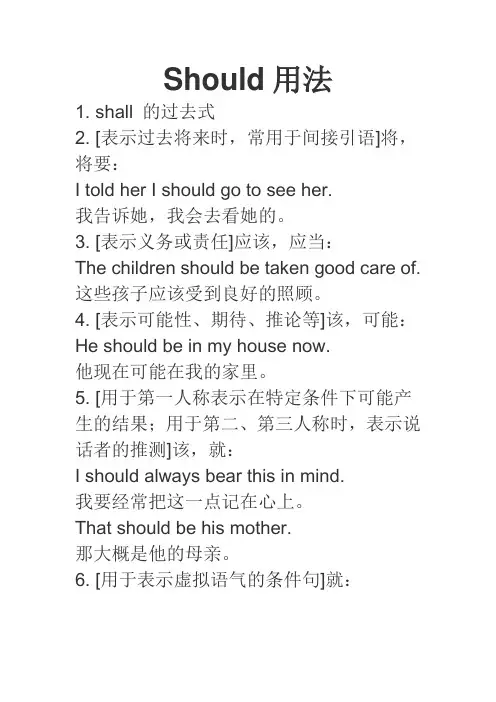
Should用法1. shall 的过去式2. [表示过去将来时,常用于间接引语]将,将要:I told her I should go to see her.我告诉她,我会去看她的。
3. [表示义务或责任]应该,应当:The children should be taken good care of. 这些孩子应该受到良好的照顾。
4. [表示可能性、期待、推论等]该,可能:He should be in my house now.他现在可能在我的家里。
5. [用于第一人称表示在特定条件下可能产生的结果;用于第二、第三人称时,表示说话者的推测]该,就:I should always bear this in mind.我要经常把这一点记在心上。
That should be his mother.那大概是他的母亲。
6. [用于表示虚拟语气的条件句]就:Let me know if you should hear more news.万一听到更多消息,请告诉我。
7. [用于表示目的或由lest 等引导的从句]可以,会:I let them go out lest I should be bothered. 我让他们去了外边,免得他们打扰我。
8. [用于表示建议、命令、要求等的从句中]应该,必须:He insisted that we should stay.他坚持让我们留下。
The workers demanded that their wages should be raised.工人们要求提高工资。
9. [用于表示惊异、赞叹、不满等的句子中]竟然,竟会:Why should you be so early today?今天怎么来得这么早?How should I do?我怎么办呀?10. [用于表示委婉、谦虚等的句子中]可,倒是:I should advise you not to do that.我倒是劝你别这样做。
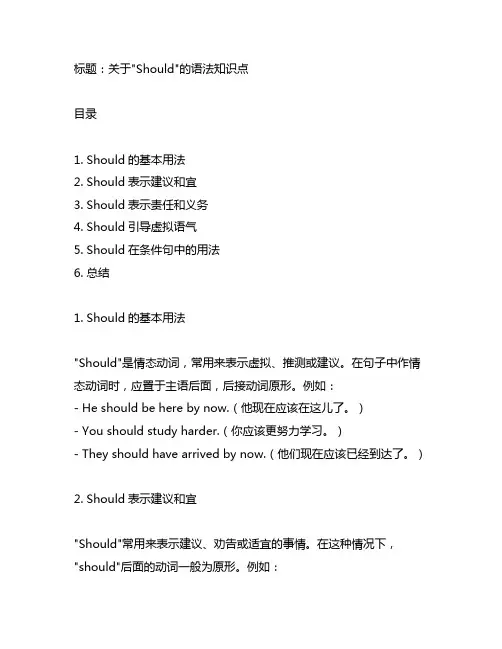
标题:关于"Should"的语法知识点目录1. Should的基本用法2. Should表示建议和宜3. Should表示责任和义务4. Should引导虚拟语气5. Should在条件句中的用法6. 总结1. Should的基本用法"Should"是情态动词,常用来表示虚拟、推测或建议。
在句子中作情态动词时,应置于主语后面,后接动词原形。
例如:- He should be here by now.(他现在应该在这儿了。
)- You should study harder.(你应该更努力学习。
)- They should have arrived by now.(他们现在应该已经到达了。
)2. Should表示建议和宜"Should"常用来表示建议、劝告或适宜的事情。
在这种情况下,"should"后面的动词一般为原形。
例如:- You should take a break.(你应该休息一下。
)- We should start early.(我们应该早点开始。
)- She should see a doctor.(她应该去看医生。
)3. Should表示责任和义务"Should"也可以表示责任和义务,通常用于表示某种道德上的义务或应尽的责任。
例如:- You should apologize for your mistake.(你应该为自己的错误道歉。
)- We should help those in need.(我们应该帮助有需要的人。
)- She should have returned the money.(她本应该把钱退还。
)4. Should引导虚拟语气在虚拟语气中,"should"常用来表示主观的推测或建议。
在这种情况下,"should"后面的动词一般为原形。
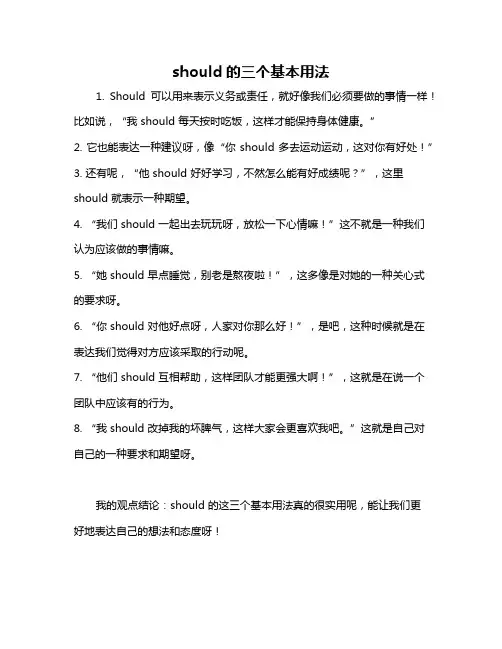
should的三个基本用法
1. Should 可以用来表示义务或责任,就好像我们必须要做的事情一样!比如说,“我 should 每天按时吃饭,这样才能保持身体健康。
”
2. 它也能表达一种建议呀,像“你 should 多去运动运动,这对你有好处!”
3. 还有呢,“他 should 好好学习,不然怎么能有好成绩呢?”,这里should 就表示一种期望。
4. “我们 should 一起出去玩玩呀,放松一下心情嘛!”这不就是一种我们认为应该做的事情嘛。
5. “她 should 早点睡觉,别老是熬夜啦!”,这多像是对她的一种关心式的要求呀。
6. “你 should 对他好点呀,人家对你那么好!”,是吧,这种时候就是在表达我们觉得对方应该采取的行动呢。
7. “他们 should 互相帮助,这样团队才能更强大啊!”,这就是在说一个团队中应该有的行为。
8. “我 should 改掉我的坏脾气,这样大家会更喜欢我吧。
”这就是自己对自己的一种要求和期望呀。
我的观点结论:should 的这三个基本用法真的很实用呢,能让我们更
好地表达自己的想法和态度呀!。
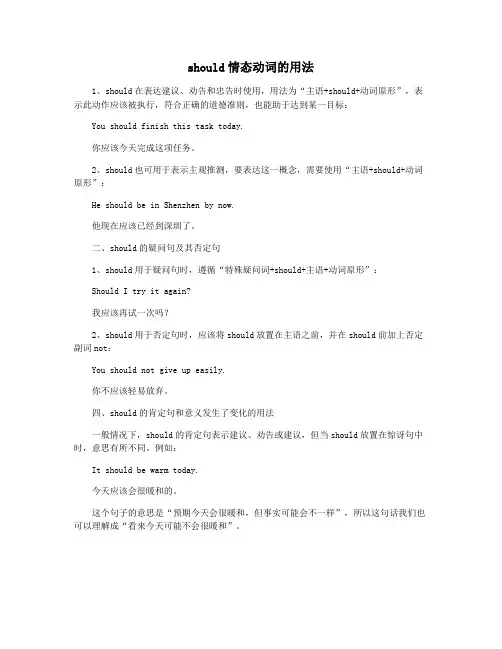
should情态动词的用法
1、should在表达建议、劝告和忠告时使用,用法为“主语+should+动词原形”,表示此动作应该被执行,符合正确的道德准则,也能助于达到某一目标:
You should finish this task today.
你应该今天完成这项任务。
2、should也可用于表示主观推测,要表达这一概念,需要使用“主语+should+动词原形”:
He should be in Shenzhen by now.
他现在应该已经到深圳了。
二、should的疑问句及其否定句
1、should用于疑问句时,遵循“特殊疑问词+should+主语+动词原形”:
Should I try it again?
我应该再试一次吗?
2、should用于否定句时,应该将should放置在主语之前,并在should前加上否定副词not:
You should not give up easily.
你不应该轻易放弃。
四、should的肯定句和意义发生了变化的用法
一般情况下,should的肯定句表示建议、劝告或建议,但当should放置在惊讶句中时,意思有所不同。
例如:
It should be warm today.
今天应该会很暖和的。
这个句子的意思是“预期今天会很暖和,但事实可能会不一样”,所以这句话我们也可以理解成“看来今天可能不会很暖和”。
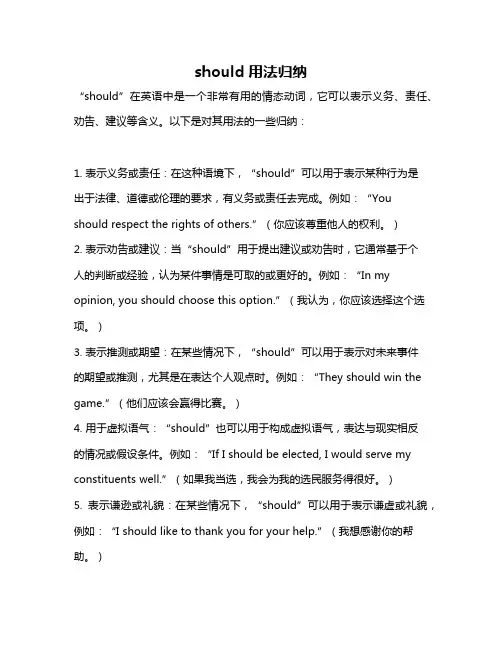
should用法归纳“should”在英语中是一个非常有用的情态动词,它可以表示义务、责任、劝告、建议等含义。
以下是对其用法的一些归纳:1. 表示义务或责任:在这种语境下,“should”可以用于表示某种行为是出于法律、道德或伦理的要求,有义务或责任去完成。
例如:“You should respect the rights of others.”(你应该尊重他人的权利。
)2. 表示劝告或建议:当“should”用于提出建议或劝告时,它通常基于个人的判断或经验,认为某件事情是可取的或更好的。
例如:“In my opinion, you should choose this option.”(我认为,你应该选择这个选项。
)3. 表示推测或期望:在某些情况下,“should”可以用于表示对未来事件的期望或推测,尤其是在表达个人观点时。
例如:“They should win the game.”(他们应该会赢得比赛。
)4. 用于虚拟语气:“should”也可以用于构成虚拟语气,表达与现实相反的情况或假设条件。
例如:“If I should be elected, I would serve my constituents well.”(如果我当选,我会为我的选民服务得很好。
)5. 表示谦逊或礼貌:在某些情况下,“should”可以用于表示谦虚或礼貌,例如:“I should like to thank you for your help.”(我想感谢你的帮助。
)总的来说,“should”是一个非常灵活的词语,其用法取决于具体的语境和说话者的意图。
正确地使用“should”可以帮助我们更准确地表达自己的想法,同时也能更好地理解别人的意思。
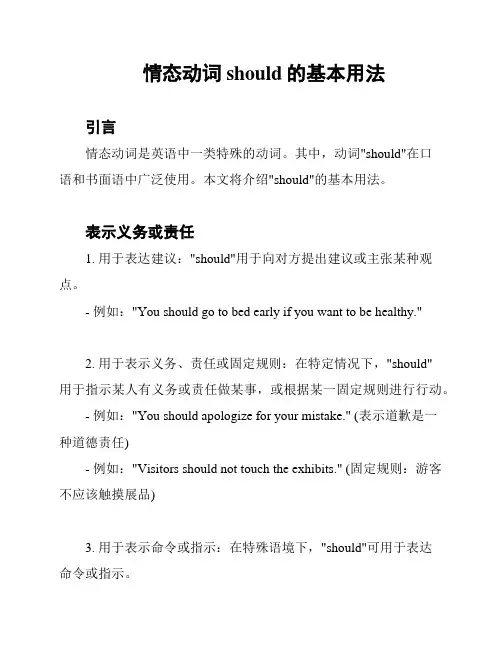
情态动词should的基本用法引言情态动词是英语中一类特殊的动词。
其中,动词"should"在口语和书面语中广泛使用。
本文将介绍"should"的基本用法。
表示义务或责任1. 用于表达建议:"should"用于向对方提出建议或主张某种观点。
- 例如:"You should go to bed early if you want to be healthy."2. 用于表示义务、责任或固定规则:在特定情况下,"should"用于指示某人有义务或责任做某事,或根据某一固定规则进行行动。
- 例如:"You should apologize for your mistake." (表示道歉是一种道德责任)- 例如:"Visitors should not touch the exhibits." (固定规则:游客不应该触摸展品)3. 用于表示命令或指示:在特殊语境下,"should"可用于表达命令或指示。
- 例如:"You should stop talking and listen to me."表示推测或假设1. 用于表示推测:"should"可用于表达对某事的合理推测。
- 例如:"He should be at home by now." (合理推测:他现在应该已经回家了)2. 用于表示假设:在条件状语从句中,"should"可以表示假设或可能性。
- 例如:"If it should rain tomorrow, we will stay indoors."提醒或警示1. 用于提醒或警示:"should"可以用于提醒或警示某人注意某事,以免发生问题。
should的用法总结should表示应该,掌握should的用法对英语学习是很有必要的,下面小编给大家整理了should的用法总结,希望大家喜欢!should的释义(常用于纠正别人) 应该,应当; (提出或征询建议) 该,可以; (表示预期) 应该会,可能;should的用法■表示“应该,应当”He should work harder. 他应该更加努力。
You should help your mother with the housework. 你应该帮你母亲做家务。
Crime should be punished. 犯罪应受惩罚。
Should I wear a coat?我要穿大衣吗?■表示“可能,该(=will probably) ”He should arrive soon他可能很快就到了。
The train should have already left. 火车大概已经走了。
■表示“万一”If it should rain tomorrow, don’t expect me. 万一明天下雨,就不要等我了。
■表示“竟然”It’s strange that he should be late. 真奇怪,他竟会迟到。
■表示粗暴地拒绝一项建议、要求或指示—What time does the film start? 电影什么时候开始?—How should I know? 我怎么知道?—Ann’s very unhappy. 安非常不高兴。
—Why should I care? 这管我什么事?—Could your wife help us in the office tomorrow? 你妻子明天能到办公室来帮帮我们吗?—Why should she? She doesn’t work for you. 她为什么就该去? 她又不是为你们工作的。
■should加完成式:should have done表示“本应该做某事,但事实上却没有做”;shouldn’t have done表示“本不该做某事,但事实上却做了”。
“should”用法归纳一、Should 表示过去将来时,即从过去观点看将来要发生的是,多用于间接引语中。
We thought that we should never see you again. 我们想我们再也看不到你了。
The BBC weather report this morning said that we should have rain.今天早上,BBC电台天气报告说,今天有雨。
二、Should 表示义务、责任、常译为“应当”,“应该”,或表示一种估计的情况,译成“按理应当”,“估计......”。
Why should I pay him? 为什么我该付给他钱?They should be there by now, I think. 我估计,他们现在到那儿了。
Should 用于完成时态,表示对过去发生的动作的一种推测,译成“应该已经......”。
You should have washed the wood. (But you haven’t.) 你应该把伤口清洗了。
(然而你没有)三、Should 用于虚拟语气中。
(1)用于It is necessary (important, strange...that...)中,在美国英语中should 常省去。
It is important that we (should) learn English well. 我们学好英语很重要。
(2)用于It is ordered (suggested)that...中,而在美语中should常省去。
It is decided that we (should) finish our work in a week.决定我们要在一周之内完成我们的工作。
(3)用于表示命令、请求、建议、决定等词后面的宾语从句中,在美国英语中should常省去。
He wrote, suggesting that Mr. Wang (should) come to Beijing. 他信中建议王先生到北京来。
should的语法
"should" 是情态动词,用于表示建议、推测、义务、假设或可能性。
下面是一些 "should" 的语法用法:
1. 表示建议:
- 主语 + should + 动词原形
例:你应该多运动。
(You should exercise more.)
2. 表示推测或假设:
- 主语 + should + 动词原形
例:他应该已经到了。
(He should have arrived by now.)
3. 表示义务或期望:
- 主语 + should + 动词原形
例:你应该完成作业。
(You should finish your homework.)
4. 表示可能性:
- 主语 + should + 动词原形
例:他们可能会迟到。
(They should be late.)
5. 在虚拟条件句中:
- 如果从句 (if clause) 使用过去完成时,主句 (main clause) 使用 "should + have + 过去分词"
例:如果我知道,我应该帮助他们。
(If I had known, I should have helped them.)
需要注意的是,“should” 是一个情态动词,因此后面接动词
原形,不需要加上 "-s" 或 "-ed"。
同时,它没有人称和数的变化。
should的用法及句型"Should" 是一种辅助动词,常用于表示建议、推荐、应该、可能等意义。
它可以用于肯定句、否定句、疑问句等句型中,具体用法如下:1. 表示建议或推荐- You should take a vacation.你应该去度假。
- We should start the project as soon as possible.我们应该尽快开始这个项目。
2. 表示假设或可能性- This should help you out.这应该会帮到你。
- He should be here by now.他现在应该已经到了。
3. 表示责任- You should apologize to her.你应该向她道歉。
- The government should do more to protect the environment.政府应该做更多的工作来保护环境。
4. 表示意愿或建议- I think you should talk to him about it.我认为你应该和他谈谈。
- Should we go to the movies tonight?今晚我们去看电影好不好?5. 表示条件- If you should need anything, don't hesitate to ask. 如果你需要什么,别犹豫问我。
6. 表示承认或否认- You should know better than to do that.你应该知道这样做不好。
- He shouldn't have done that.他不应该这么做。
should的用法和例句
should的用法和例句如下:
1、情态动词:should表示“应该,应当”,常用来征求别人的意见和建议。
后接动词原形,没有人称和数的变化。
肯定句句型:主语+should+动词原形+其他成分。
例句:You should stop talking.你应该戒烟。
2、命令或者要求:should表示命令或者要求。
否定句句型:主语+should+not+动词原形+其他成分。
例句:You shouldn't talk in class.你不许在课堂上讲话。
3、预测或者可能:should表示预测或者可能。
例句:His schoolbag should be in the classroom.他的书包应该在教室里面。
4、失望、愤怒和惊讶:should有时表示说话人的失望、愤怒和惊讶。
例句:Why should I go?为什么是我去?。
牛津Should用法(字典原文1613)1. Used to show what is right, appropriate, etc., especially when criticizing sb‟s actions(常用于纠正别人)应该,应当:Y ou shouldn‟t drink and drive.你不应该酒后驾车。
He should have been more careful.他应当更小心一点才是。
ed for giving or asking for advice (提出征询或建议)该,可以。
You should stop worrying about it.你不应该再担心那件事了。
Should I call him and apologize?我是不是应该打电话向他道歉?I should wait a little longer, if I were you.假如我是你的话,我就再等会。
(ironic)”she doesn‟t think she will get a job.”“She should worry, with all her qualifications. “她担心找不到工作。
”她那么好条件,可真该担心的(反语)。
3. Used to say that you expect sth. is true or will happen (表示预期,可能)。
We should arrive before dark.我们天黑之前应该能赶到。
I should have finished the book by Friday.到星期五我应该能读完那本书。
The road should be less crowded today. 今天路应该不那么挤了把。
ed to say that sth that was expected has not happened (与预期相反)本应,本当。
It should be snowing now, according to the weather forecast.按天气预报,现在应该下雪才是。
The bus should have arrived 10 minutes ago.公共汽车十分钟以前就该到了。
5. (BrE formal)I or we instead of would for describing what you would do if sth else happened first.与I 或we连用代替would,表示虚拟结果;就将。
If I was asked to work on Sundays, I should resign.要是叫我星期天加班,我就不干了。
6. (Formal) used to refer to a possible event or situation. (表示可能)假如,万一。
If you should change your mind, do let me know.假如你改变主意的话,一定让我知道。
In case you should need any help, here‟s my number.万一你需要帮助的话,这是我的电话号码。
Should anyone call (=if anyone calls), please tell him I‟m busy.如果有人打电话来,请告诉他我正忙着。
7. used as the past form of shall when reporting what sb has said.在间接引语中用作shall的过去式。
He asked me what he should come.他问我应该什么时候来。
(BrE formal)I said (that) I should be glad to help.我说我乐意帮忙。
8.(BrE)used after that when sth is suggested or arranged.(用于that引导的,表示建议或安排的从句中). She recommended that I should take some time off.他建议我应该休息一段时间。
In order that training should be effective it must be planed systematically.为了培训有成效,必须有系统性的计划。
(should可以省略)9. Used after that after many adjective words that describe feelings. (用于许多表示感情的形容词后的that从句中)。
I‟m anxious that we should allow plenty of time.我殷切希望我们能流出充裕的时间。
I found it astonishing that he should be so rude to you.他竟然对你这样无礼,真叫我吃惊。
10. (BrE formal)used with we and I in polite requests.(与I和we连用,表示客气的请求) I should like to call my lawyer. 我希望给我的律师打个电话。
We should be grateful for you help.对您的帮助我会非常感激。
11. used with I and we to give opinions that you are not certain about.(与I和we连用,表示没有把握)I should imagine it will take about 3 hours.我想得用差不多三个小时吧。
Is this enough food for everyone? I should think so.食物够所有人吃吗?我想够了。
“Will it matter?”“I shouldn‟t think so.”这有关系吗?不会吧。
ed to express strong agreement(表示十分赞同)。
“I know it‟s expensive but it will last for years.”“I should think so too!”我知道价钱贵,但他可以用好多年。
我也是这么想的!“Nobody will oppose it.”“I should think not!”谁也不会反对,我想也是!13. why, how who what~sb/sth do. Used to refuse sth or to show that you are annoyed at a request; used to express surprise about an event or a situation. (表示愤怒、拒绝或惊讶)。
Why should I help him?he‟s never done anything to me.我为什么要帮他?他从没为我做过什么。
How should I know where you have left your bag? 我怎么知道你把包放在哪了?14. Used to tell sb that sth would amuse or surprise them if they saw or experienced it. (表示假如对方看见或经历某事物,一定会感兴趣或吃惊)真该,真应当。
You should have seen her face when she found out! 你真该看看他发现事情真相时的表情!语法说明一:Should/ought/had betterShould and ought to are both used to say that something is the best thing or the right thing to do, but should is much more common. Should和ought to均用以表示应该做某事,但should用的更多。
You should take the baby to the doctor‟s.你应该把婴儿带过去看医生。
I ought to give up smoking.我应该戒烟。
In questions, should is usuallyused instead of ought to.在疑问句中,通常用should而不用ought to。
Should we call the doctor?Had better can also be used to say what is the best thing to do in a situation that is happening now. had better 亦可表示在目前状况下最好做某事。
We‟d better hurry or we will miss the train.You form the past by using should have or ought to have. 过去时由should have或ought to have构成。
She should have asked for help.她本应请求帮助的。
You ought to have been more careful.你本应该更小心一点的。
The forms should not or shouldn‟t (and ought not to or oughtn‟t to, which are rare in AmE and BrE )are used to say that something is a bad idea or the wrong thing to do) should not或shouldn‟t(以及在美国英语很少见,英国英语中为正式用法的ought not to或oughtn‟t to)表示不应该。
You shouldn‟t drive so fast.你不应该把车开得那么快。
The forms should not have or shouldn‟t have and, much less frequently, ought not to have or oughtn‟t to have are used to talk about the past. Should not have或shouldn‟t have以及较少用的ought not to have 或oughtn‟t to have 均指过去。